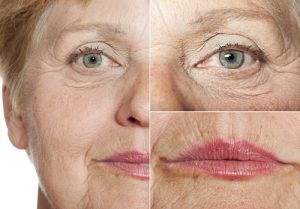 Sun Exposure and Skin Cancer
Sun Exposure and Skin Cancer
The sun’s rays make us feel good, and in the short term, make us look good. But our love affair isn’t a two-way street. Exposure to sun causes most of the wrinkles and age spots on our faces.
Consider this:
One woman at age 40 who has protected her skin from the sun actually has the skin of a 30-year-old! We often associate a glowing complexion with good health, but skin color obtained from being in the sun – or in a tanning booth – actually accelerates the effects of aging and increases your risk for developing skin cancer. Sun exposure causes most of the skin changes that we think of as a normal part of aging. Over time, the sun’s ultraviolet (UV) light damages the fibers in the skin called elastin. When these fibers break down, the skin begins to sag, stretch, and lose its ability to go back into place after stretching. The skin also bruises and tears more easily — taking longer to heal. So while sun damage to the skin may not be apparent when you’re young, it will definitely show later in life.
often associate a glowing complexion with good health, but skin color obtained from being in the sun – or in a tanning booth – actually accelerates the effects of aging and increases your risk for developing skin cancer. Sun exposure causes most of the skin changes that we think of as a normal part of aging. Over time, the sun’s ultraviolet (UV) light damages the fibers in the skin called elastin. When these fibers break down, the skin begins to sag, stretch, and lose its ability to go back into place after stretching. The skin also bruises and tears more easily — taking longer to heal. So while sun damage to the skin may not be apparent when you’re young, it will definitely show later in life.
How Does the Sun Change My Skin?
Exposure to the sun causes:
• Pre-cancerous (actinic keratosis) and cancerous (basal cell carcinoma, squamous cell carcinoma and melanoma) skin lesions – due to decreases in the skin’s immune function
• Benign tumors
• Fine and coarse wrinkles
• Freckles
• Discolored areas of the skin, called mottled pigmentation
• Sallowness — a yellow discoloration of the skin
• Telangiectasias — the dilation of small blood vessels under the skin
• Elastosis — the destruction of the elastic and collagen tissue (causing lines, wrinkles and sagging skin)
 What Causes Skin Cancer?
What Causes Skin Cancer?
Skin cancer is the most prevalent form of all cancers in the U.S. and the number of cases continues to rise. It is the uncontrolled growth of abnormal skin cells. This rapid growth results in tumors, which are either benign (noncancerous) or malignant (cancerous).
There are three main types of skin cancer:
- basal cell carcinoma,
- squamous cell carcinoma
- melanoma.
Basal cell and squamous cell cancers are less serious types and make up 95% of all skin cancers. Also referred to as non-melanoma skin cancers, they are highly curable when treated early. Melanoma, made up of abnormal skin pigment cells called melanocytes, is the most serious form of skin cancer and causes 75% of all skin cancer deaths. Left untreated, it can spread to other organs and is difficult to control.
It’s a great idea to see your dermatologist on a regular basis to scan your skin for suspect issues of the skin. Dr. Rueckl will give you ideas for sun protection as well as sunscreens that are more potent against the rays of the sun.





